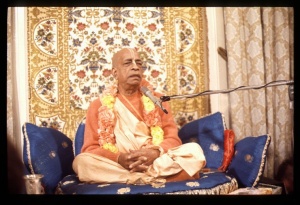SB 3.15.11: Difference between revisions
(Vanibot #0018 edit: make synonym terms in Sanskrit italic in SB - Vanisource) |
(Vanibot #0054 edit - transform synonyms into clickable links, which search similar occurrences) |
||
| Line 24: | Line 24: | ||
<div class="synonyms"> | <div class="synonyms"> | ||
''maitreyaḥ uvāca'' | ''[//vanipedia.org/wiki/Special:VaniSearch?s=maitreyaḥ&tab=syno_o&ds=1 maitreyaḥ] [//vanipedia.org/wiki/Special:VaniSearch?s=uvāca&tab=syno_o&ds=1 uvāca]'' — Maitreya said; ''[//vanipedia.org/wiki/Special:VaniSearch?s=saḥ&tab=syno_o&ds=1 saḥ]'' — he; ''[//vanipedia.org/wiki/Special:VaniSearch?s=prahasya&tab=syno_o&ds=1 prahasya]'' — smiling; ''[//vanipedia.org/wiki/Special:VaniSearch?s=mahā&tab=syno_o&ds=1 mahā]-[//vanipedia.org/wiki/Special:VaniSearch?s=bāho&tab=syno_o&ds=1 bāho]'' — O mighty-armed (Vidura); ''[//vanipedia.org/wiki/Special:VaniSearch?s=bhagavān&tab=syno_o&ds=1 bhagavān]'' — the possessor of all opulences; ''[//vanipedia.org/wiki/Special:VaniSearch?s=śabda&tab=syno_o&ds=1 śabda]-[//vanipedia.org/wiki/Special:VaniSearch?s=gocaraḥ&tab=syno_o&ds=1 gocaraḥ]'' — who is understood by transcendental sound vibration; ''[//vanipedia.org/wiki/Special:VaniSearch?s=pratyācaṣṭa&tab=syno_o&ds=1 pratyācaṣṭa]'' — replied; ''[//vanipedia.org/wiki/Special:VaniSearch?s=ātma&tab=syno_o&ds=1 ātma]-[//vanipedia.org/wiki/Special:VaniSearch?s=bhūḥ&tab=syno_o&ds=1 bhūḥ]'' — Lord Brahmā; ''[//vanipedia.org/wiki/Special:VaniSearch?s=devān&tab=syno_o&ds=1 devān]'' — the demigods; ''[//vanipedia.org/wiki/Special:VaniSearch?s=prīṇan&tab=syno_o&ds=1 prīṇan]'' — satisfying; ''[//vanipedia.org/wiki/Special:VaniSearch?s=rucirayā&tab=syno_o&ds=1 rucirayā]'' — with sweet; ''[//vanipedia.org/wiki/Special:VaniSearch?s=girā&tab=syno_o&ds=1 girā]'' — words. | ||
</div> | </div> | ||
Latest revision as of 21:31, 17 February 2024

A.C. Bhaktivedanta Swami Prabhupada
TEXT 11
- maitreya uvāca
- sa prahasya mahā-bāho
- bhagavān śabda-gocaraḥ
- pratyācaṣṭātma-bhūr devān
- prīṇan rucirayā girā
SYNONYMS
maitreyaḥ uvāca — Maitreya said; saḥ — he; prahasya — smiling; mahā-bāho — O mighty-armed (Vidura); bhagavān — the possessor of all opulences; śabda-gocaraḥ — who is understood by transcendental sound vibration; pratyācaṣṭa — replied; ātma-bhūḥ — Lord Brahmā; devān — the demigods; prīṇan — satisfying; rucirayā — with sweet; girā — words.
TRANSLATION
Śrī Maitreya said: Thus Lord Brahmā, who is understood by transcendental vibration, tried to satisfy the demigods, being pleased with their words of prayer.
PURPORT
Brahmā could understand the misdeeds of Diti, and therefore he smiled at the whole situation. He replied to the demigods present there in words they could understand.